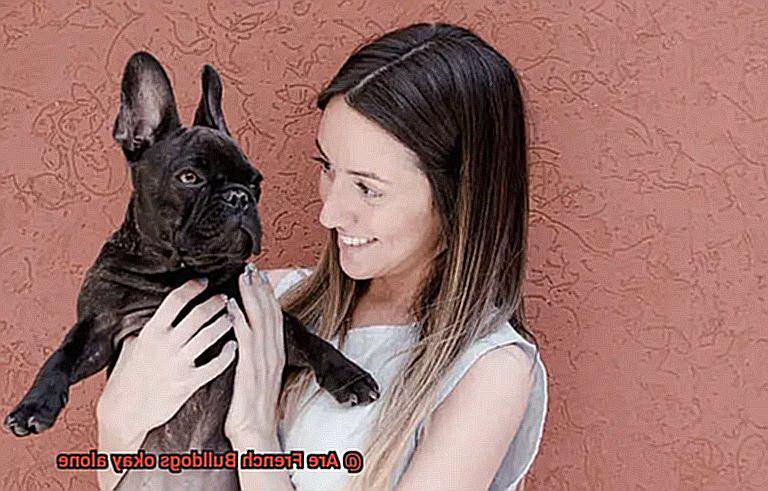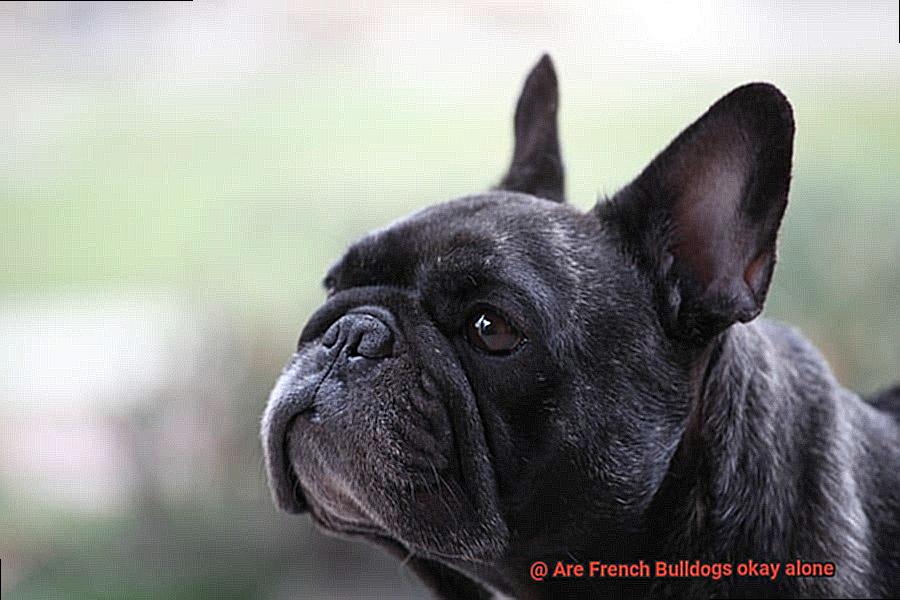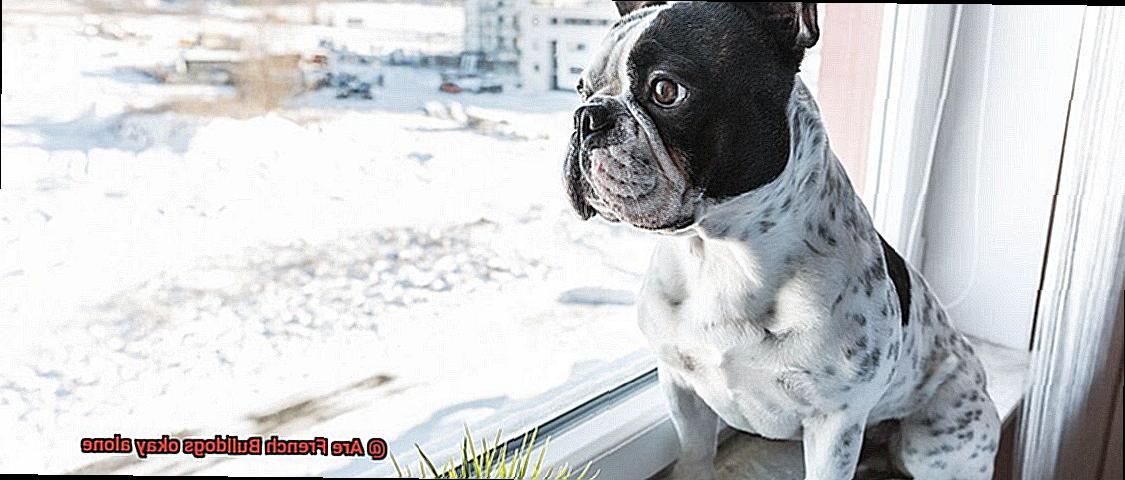Are French Bulldogs okay alone?
You’re the proud parent of a French Bulldog, huh? Well, let me guess – you’ve probably heard all sorts of tales about these little furballs and their ability (or lack thereof) to handle being left alone. From hushed conversations at the dog park to conflicting advice from fellow pet lovers, it’s enough to make your head spin. But fear not. In this blog post, we’re going to dig deep into the world of French Bulldogs and get to the bottom of this age-old question: Can they really handle solitude? So grab a cup of joe, settle in, and prepare for some myth-busting that might just surprise you.
Are French Bulldogs okay alone
Contents
- 1 Are French Bulldogs okay alone
- 2 The Need for Companionship in French Bulldogs
- 3 Potential Behavioral Issues When Left Alone
- 4 Short-Term Solutions for Leaving French Bulldogs Alone
- 5 Long-Term Solutions to Prepare French Bulldogs for Being Left Alone
- 6 Crate Training as a Comforting Solution for French Bulldogs
- 7 Avoid Excessive Hours of Isolation for French Bulldogs
- 8 Hiring Dog Sitters or Enrolling in Doggy Daycare
- 9 Seeking Professional Help if Necessary
- 10 Conclusion
French Bulldogs, with their adorable flat faces and expressive eyes, have become popular pets in recent years. These lovable dogs are known for their affectionate nature and make great companions for their owners. However, many owners often wonder if it’s okay to leave their French Bulldogs alone for extended periods of time.
French Bulldogs thrive on human companionship, and leaving them alone for long durations can lead to separation anxiety. Just like humans, these furry friends can become anxious or even depressed when left alone for extended periods. They may resort to excessive barking, destructive behavior, or even self-harm as a way to cope with their loneliness.
There are steps you can take to ensure your French Bulldog remains happy and content, even when you’re not around. Here are some tips to keep in mind:
- Mental and Physical Stimulation: Before leaving your French Bulldog alone, provide them with plenty of mental and physical stimulation. Take them for a long walk, engage them in playtime, or try out interactive toys that challenge their minds. This helps tire them out and keeps them occupied while you’re away.
- Crate Training: Consider crate training your French Bulldog as a way to provide them with a safe and secure space when they are alone. Gradually introduce the crate and make it a positive experience for your furry friend. Remember, the crate should never be used as a form of punishment.
- Canine Companion: Another option is to consider getting a second dog as a companion for your French Bulldog. Having a furry friend around can help alleviate their separation anxiety and provide constant company. However, make sure the two dogs get along well before leaving them alone together.
- Alternative Options: If you need to leave your French Bulldog alone for extended periods on a regular basis, consider alternative options such as doggy daycare or hiring a pet sitter. These options allow your French Bulldog to have social interaction and supervision while you’re away.
Remember, every French Bulldog is different, and some may cope better with being alone compared to others. Factors such as their individual temperament, age, and previous experiences can influence how well they handle being left alone. It’s essential to understand their needs and take steps to address any separation anxiety they may experience.
The Need for Companionship in French Bulldogs
French Bulldogs, also known as “Frenchie” lovers, are social and affectionate dogs who thrive on human interaction. They have a strong bond with their owners and enjoy being an integral part of the family unit. Neglecting their need for companionship can lead to loneliness, depression, separation anxiety, and even destructive behavior. So, it’s crucial for Frenchie owners to prioritize providing companionship for their furry friends.
Why is companionship essential?
French Bulldogs are not the kind of dogs you can leave alone for long periods without consequences. They crave attention and love being around people. When left alone for extended periods, they can become anxious, leading to destructive behavior such as chewing furniture or excessive barking. This can be detrimental to their overall well-being, causing stress and even physical harm.
Companionship solutions:
- Canine Companions: If adding another dog to your family is an option, it can be an excellent solution for your Frenchie’s need for companionship. French Bulldogs often get along well with other dogs, especially if they have been properly socialized. Having a furry sibling can provide them with constant company and playtime.
- Quality Time: If getting another dog is not feasible, spending quality time with your French Bulldog is essential. Engage in activities that fulfill their need for companionship, such as playtime, walks, and cuddles. Make them feel loved and included in your daily routine.
- Doggy Daycare or Dog Walker: Consider enrolling your Frenchie in doggy daycare or hiring a dog walker if you work long hours or have a busy schedule. This will ensure they receive regular social interaction and mental stimulation throughout the day.
- Avoid Extended Alone Time: Leaving a French Bulldog alone for extended periods, such as a full workday, should be avoided whenever possible. If you must leave them alone, ensure they have plenty of toys, a comfortable environment, and provide mental stimulation through puzzle toys or treat-dispensing toys.
Potential Behavioral Issues When Left Alone
French Bulldogs are known for their sociable and affectionate nature, making them excellent companions. However, when left alone for extended periods, they can experience a range of behavioral issues. In this section, we will explore some of the potential issues that French Bulldogs may face when left alone and how to address them.
- Separation Anxiety: French Bulldogs are prone to separation anxiety when left alone. This can manifest in destructive behaviors such as excessive chewing, digging, and scratching. They may also bark excessively or whine when separated from their owners. To help alleviate separation anxiety, it is important to gradually acclimate your Frenchie to being alone by starting with short periods and gradually increasing the duration. Providing them with interactive toys or leaving a radio or TV on for background noise can also help distract them.
- Escape Behaviors: Some French Bulldogs may develop escape behaviors when left alone. They may attempt to find a way out of their confinement or the house, putting themselves at risk of injury or getting lost. It is crucial to ensure that your home is secure and that your Frenchie is kept in a safe and comfortable environment when left alone.
- Excessive Attachment: French Bulldogs are known for their loyalty and can become overly attached to their owners. When left alone, they may exhibit clingy behaviors, constantly following their owners around the house. This excessive attachment can make it difficult for them to cope with separation and lead to distress. It is important to create a routine that includes designated alone time for your Frenchie to gradually reduce their dependence on constant human presence.
- Boredom: When left alone for long periods, French Bulldogs can become bored, which can result in destructive behaviors. They may chew on furniture, shoes, or other household items out of frustration or boredom. Providing mental stimulation through puzzle toys or interactive games can help keep your Frenchie entertained and prevent boredom-related issues.
- Self-Soothing Behaviors: Some French Bulldogs may resort to self-soothing behaviors when left alone, such as excessive licking or chewing on themselves. This can be a sign of stress or anxiety. If you notice these behaviors, it is important to consult with a veterinarian or a professional dog behaviorist to address the underlying cause and develop a suitable plan for your Frenchie’s well-being.
Short-Term Solutions for Leaving French Bulldogs Alone
Leaving your French Bulldog alone can be a challenge, as this breed is known to experience separation anxiety. However, with the right strategies and solutions in place, you can help alleviate their stress and ensure they feel safe and secure when you’re away. In this blog post, we will discuss short-term solutions for leaving French Bulldogs alone, including crate training, mental stimulation, background noise, hiring a dog walker or pet sitter, and calming aids.
Crate Training:
Crate training is a valuable tool that provides your Frenchie with a safe and comfortable space when left alone. Follow these steps to crate train your dog:
- Gradually introduce the crate by leaving the door open and placing treats or toys inside.
- Associate positive experiences with the crate, such as feeding meals or giving special treats inside.
- Make the crate cozy with soft bedding and familiar scents.
- Never use the crate as a form of punishment.

Mental Stimulation:
French Bulldogs are intelligent dogs that thrive on mental stimulation. Provide interactive toys or puzzle feeders that require problem-solving skills to access treats or food. This will keep their minds engaged and prevent boredom.

Background Noise:
Leaving a radio or TV on in the background can create a soothing environment for your Frenchie. The noise and voices mimic human presence and make them feel less alone. Choose calming channels or programs that won’t overstimulate your dog.
Hire a Dog Walker or Pet Sitter:
Consider hiring a dog walker or pet sitter to check in on your French Bulldog during the day. This provides them with companionship and exercise, breaking up the monotony of being alone for extended periods.
Calming Aids:
If your Frenchie experiences severe separation anxiety, consider using calming aids such as pheromone diffusers or natural supplements. These products can create a soothing environment and promote relaxation in dogs.
Long-Term Solutions to Prepare French Bulldogs for Being Left Alone
Being a French Bulldog owner comes with its fair share of joys and responsibilities. Frenchies are known for their affectionate and sociable nature, making it essential for owners to address their needs when it comes to being left alone. While it is not ideal for any dog breed to be left alone for extended periods, there are several long-term solutions that can help prepare French Bulldogs for this situation.
Gradual Desensitization
One effective approach is to gradually desensitize your French Bulldog to being left alone. Start by leaving them alone for short periods, such as a few minutes, and gradually increase the duration over time. This process helps them become accustomed to your absence and reduces the likelihood of separation anxiety.
Establish a Routine
Dogs thrive on routine, and French Bulldogs are no exception. Establishing a consistent daily routine can help them feel more secure and less anxious when left alone. Stick to a regular schedule for feeding, exercise, playtime, and rest, ensuring that they have ample mental and physical stimulation before you leave.
Crate Training
Crate training can provide a safe and secure space for your French Bulldog when you’re not at home. Introduce the crate as a positive and comfortable environment, using treats, toys, and soft bedding to make it inviting. Gradually increase the amount of time your Frenchie spends in the crate while you’re away, making sure they associate it with positive experiences.
Interactive Toys and Puzzles
Keeping your French Bulldog mentally stimulated while you’re away can help alleviate boredom and prevent destructive behaviors. Invest in interactive toys and puzzles that dispense treats or require problem-solving skills. These toys can keep your Frenchie engaged and entertained during your absence.
Doggy Daycare or Dog Walker
If your schedule permits, consider enrolling your French Bulldog in a doggy daycare program or hiring a dog walker. These options provide socialization opportunities and ensure that your Frenchie receives attention and exercise while you’re away. This can be particularly beneficial for French Bulldogs, as they thrive on companionship and interaction.
Separation Anxiety Training
If your French Bulldog already displays signs of separation anxiety, it may be helpful to seek professional training or consult with a veterinarian. They can provide guidance on specific techniques and strategies to address this issue effectively. It’s essential to understand that separation anxiety is a serious condition that requires patience, consistency, and professional assistance to overcome.
By implementing these long-term solutions, you can help prepare your French Bulldog for being left alone and alleviate any potential stress or anxiety they may experience. Remember to be patient and consistent in your approach, as each dog is unique and may require different strategies. With time, understanding, and proper training, your French Bulldog can learn to feel comfortable and secure when left alone.
Crate Training as a Comforting Solution for French Bulldogs
Luckily, crate training can be an effective and comforting solution to help alleviate their stress and provide them with a safe space. As an expert in dog training, I’ll walk you through the process of crate training your French Bulldog and explain how it can become their sanctuary when you’re not around.
Choosing the Right Crate:
To start crate training, it’s crucial to select the right size crate for your French Bulldog. A crate that is too small can cause discomfort, while one that is too large may not feel secure. Ensure the crate allows your Frenchie to stand up, turn around, and lie down comfortably.
Gradual Introduction:
Introducing the crate gradually is key to success. Begin by placing treats and toys inside the crate to entice your Frenchie to explore it willingly. Associate positive experiences with the crate, such as feeding meals inside or giving special treats when they enter voluntarily. This helps create a sense of comfort and security.

Consistency is Key:
Consistency is vital when crate training a French Bulldog. Establish a routine where your furry friend spends short periods of time in the crate, gradually increasing the duration as they become more comfortable. This consistency builds trust and confidence in their safe place.
Comfort Items:
Adding comfort items to the crate can further enhance its appeal. Soft bedding provides a cozy spot for your Frenchie to relax, while familiar scents can create a sense of security. Interactive toys and puzzles keep them entertained and mentally stimulated during their alone time.

Avoid Using the Crate as Punishment:
It’s essential never to use the crate as a form of punishment. The goal is to make the crate a positive space where your French Bulldog feels safe and secure, not a place associated with negative experiences.
Long-Term Solutions:
While crate training can be beneficial for alleviating separation anxiety, it should be part of a comprehensive plan. Ensure your French Bulldog receives ample exercise, mental stimulation, and socialization. Gradually increase time spent outside the crate and provide opportunities for interaction with you to prevent boredom and anxiety.
Seek Professional Assistance:
If your French Bulldog continues to show signs of distress or severe anxiety when left alone, don’t hesitate to consult with a professional dog trainer or behaviorist. They can provide personalized solutions based on your Frenchie’s specific needs.
Avoid Excessive Hours of Isolation for French Bulldogs
French Bulldogs are known for their friendly and affectionate nature. They thrive on human companionship and are highly dependent on their owners. Leaving them alone for extended periods can have negative effects on their mental and emotional well-being. Here are some reasons why it is important to avoid excessive hours of isolation for French Bulldogs:
- Separation Anxiety: French Bulldogs have a strong bond with their owners, and being separated from them for long periods can cause them to experience separation anxiety. This can lead to destructive behaviors like chewing on furniture or excessive barking.
- Loneliness and Depression: French Bulldogs are social animals and need regular interaction with their owners to feel happy and fulfilled. When left alone for too long, they can become lonely and even develop depression.
- Behavioral Issues: Isolation can contribute to the development of behavioral issues in French Bulldogs. They may start engaging in undesirable behaviors like digging, excessive licking, or even self-harming behaviors.
To prevent these problems, here are some tips to ensure your French Bulldog receives enough socialization and companionship:
- Regular Exercise: Engaging your French Bulldog in daily exercise helps burn off excess energy and keeps their minds stimulated. Take them for walks, play fetch, or engage in other activities they enjoy.
- Mental Stimulation: Provide your French Bulldog with puzzle toys or interactive games that keep them occupied when you’re not around. Keeping their minds engaged can help prevent boredom and reduce anxiety.
- Doggy Daycare or Pet Sitter: If your schedule requires you to be away from home for long hours, consider enrolling your French Bulldog in doggy daycare or hiring a pet sitter. This way, they will have company and interaction throughout the day.
- Introduce a Companion: Consider getting another pet as a companion for your French Bulldog. Whether it’s another dog or even a cat, having a furry friend can help alleviate feelings of loneliness and provide constant companionship.
- Gradual Training: Gradually train your French Bulldog to be comfortable with alone time. Start by leaving them alone for short periods and gradually increase the duration over time. This helps them develop independence and confidence.
Remember to provide a comfortable and safe space for your French Bulldog when they are left alone. Make sure they have access to fresh water, toys, and a cozy bed or crate where they can relax.
If your French Bulldog continues to struggle with excessive hours of isolation or separation anxiety, consider seeking professional help from a veterinarian or professional dog trainer.
Hiring Dog Sitters or Enrolling in Doggy Daycare
French Bulldogs are known for their sociable nature and love to be around people. As a French Bulldog owner, you want to ensure your furry friend receives the attention and care they need, especially when you’re away. In this article, we will explore the key considerations for French Bulldog owners when deciding between hiring a dog sitter or enrolling in doggy daycare.
Hiring a Dog Sitter:
- A dog sitter can provide companionship, exercise, and mental stimulation for your French Bulldog while you’re away.
- Look for a dog sitter who is experienced with French Bulldogs and understands their specific needs, including health issues, exercise requirements, and socialization needs.
- Ensure clear communication with the dog sitter, providing detailed instructions about your French Bulldog’s routine, feeding schedule, medications, and any specific behaviors or issues to be aware of.
- Regularly evaluate your French Bulldog’s well-being and happiness in the care of the dog sitter. If any signs of stress or discomfort arise, reassess the situation and explore alternative options.
Enrolling in Doggy Daycare:
- Doggy daycare provides a supervised environment where French Bulldogs can interact with other dogs and receive plenty of attention and playtime throughout the day.
- Visit the daycare facility in person to ensure cleanliness, appropriate staff-to-dog ratios, safety measures, vaccination screening, and temperament assessments.
- Some French Bulldogs may not be suitable for daycare due to temperament or health issues. In such cases, hiring a dog sitter who can provide one-on-one attention may be a better option.
When deciding between hiring a dog sitter or enrolling in doggy daycare for your French Bulldog, consider their individual needs and personality. Some dogs may prefer the familiarity of their own home and do well with a dedicated caregiver, while others thrive in a social daycare setting.
Remember to prioritize clear communication with your chosen caregiver and regularly assess your French Bulldog’s well-being in their chosen care arrangement.
By making the right choice, you can ensure your furry friend receives the love, attention, and stimulation they need even when you’re not around.
Seeking Professional Help if Necessary
While Frenchies are generally independent and adaptable, there may be times when seeking professional help becomes necessary to ensure their well-being and happiness. In this section, we will discuss the benefits of seeking professional assistance when caring for your French Bulldog.
Behavioral Changes:
French Bulldogs are social animals, and sudden behavioral changes when left alone can be a cause for concern. Excessive barking, destructive chewing, or signs of anxiety may indicate underlying issues. By consulting with a qualified veterinarian or animal behaviorist, you can address these concerns and get expert guidance on how to modify your dog’s behavior.
Busy Lifestyle:
If your work or personal commitments require you to leave your French Bulldog alone for extended periods regularly, seeking professional help is advisable. While Frenchies can handle moderate durations of alone time, excessive isolation can lead to loneliness and separation anxiety. A professional can help create a suitable routine or recommend alternatives such as doggy daycare or hiring a dog walker to ensure your Frenchie gets the attention and mental stimulation they need.
Preparing for a Frenchie:
If you are considering getting a French Bulldog but have concerns about leaving them alone due to your schedule, seeking professional advice beforehand is highly recommended. Responsible breeders or rescue organizations can provide valuable insights into the breed’s temperament and suitability for your specific circumstances. They can also offer guidance on training techniques and strategies to help your Frenchie adjust to being alone gradually.
Expert Knowledge and Experience:
By seeking professional help, you are not failing as a pet owner; in fact, it shows your commitment to your pet’s well-being. Professionals in veterinary medicine and animal behavior have extensive knowledge and experience in dealing with various canine issues, including separation anxiety. They can provide you with the necessary tools and techniques to ensure your Frenchie is happy and healthy even when you’re not around.
PP49oLtdd3U” >
Conclusion
In conclusion, it is important to consider the well-being of French Bulldogs when it comes to leaving them alone.
While they may be okay for short periods of time, extended periods of isolation can lead to negative consequences for their mental and physical health. These adorable little dogs thrive on human companionship and can suffer from separation anxiety if left alone for too long.
It is crucial to provide them with enough social interaction, mental stimulation, and exercise to keep them happy and content. Additionally, implementing strategies such as crate training and gradually increasing alone time can help ease their anxiety when they do need to be left alone.
Remember, French Bulldogs are not meant to be solitary creatures; they crave love, attention, and affection from their human companions.




